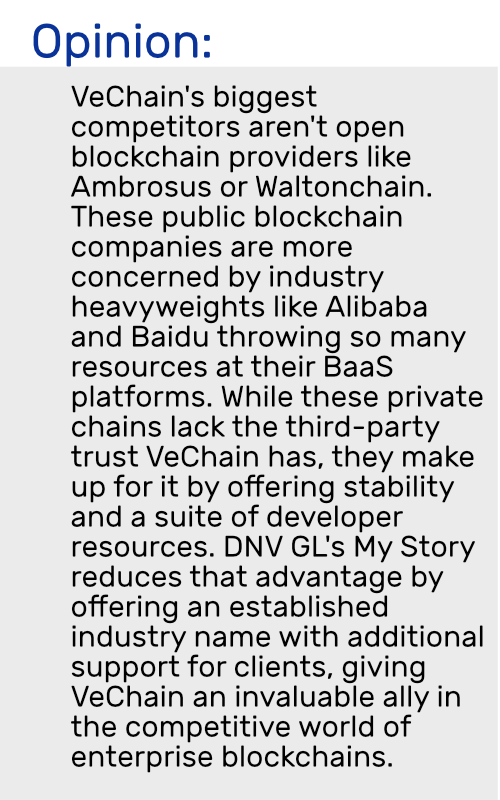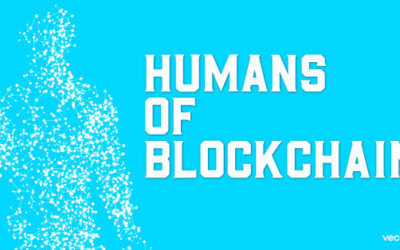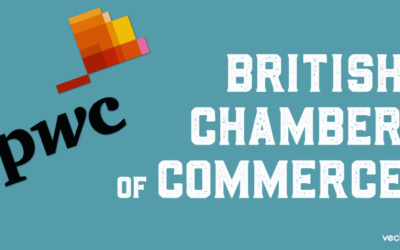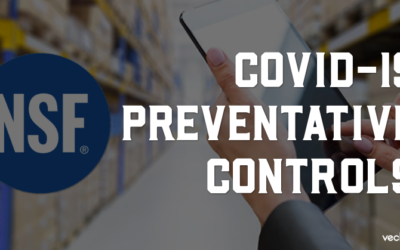For proponents of open blockchain ecosystems, the question marks are everywhere. Will regulators allow blockchains to flourish? Will real companies take these startups seriously? Will enterprises bypass closed ecosystems by established internet companies? Do these startups have the maturity to tackle such sensitive and complex political issues?
With DNV GL, all those questions are being answered with a resounding yes. Since officially partnering over a year ago, DNV GL has brought much needed professionalism and guidance to the Shanghai-based startup, VeChain.

Source: Annual Report
On April 7th, DNV GL released their 2018 annual report, containing over 130 pages detailing the different strategies the corporation used in generating over $2.3 billion USD in 2018. While maritime, energy, and oil & gas was responsible for the bulk of that, their Business Assurance and Digital Solutions made up around 25% of overall revenue.

VeChain CEO Sunny Lu signs a partnership with DNV GL’s CEO of Business Assurance, Luca Crisciotti
At the heart of their Business Assurance operations, led by CEO Luca Crisciotti, rest DNV GL’s blockchain solutions. The main solution, known as My Story, featured prominently throughout the annual report, indicating DNV GL’s commitment to the project.
My Story focuses on giving consumers access to verified data stored in the blockchain. After being online for only a short time in 2019, it has already accounted for over 1.5 million transactions on the VeChain mainnet.
For small and medium-sized enterprises, My Story allows integration of enterprise-level blockchain solutions without the headaches of developing it from the ground up. With DNV GL auditing and verifying data, the third-party nature of My Story offers tons of advantages over closed-off ecosystems such as Alibaba, IBM, or Kaleido.

Larger enterprises are also attracted to the ecosystem, and have begun working to build platforms with My Story running at the core. Notable enterprises include Haier, which chose My Story for their Internet of Clothing verification platform, and Bright Foods, with their Bright Code platform tasked with verifying the supply chains and authenticity of food and beverage products.
Arguably DNV GL’s biggest project is their Digital Low Carbon ecosystem, which partners with a number of multinational corporations including Haier, BYD, PICC, and others to reward consumers for low-carbon activities such as walking, driving electric vehicles, or operating appliances on low energy settings. All of these ecosystems are noteworthy because they feature a circular shared business model, which rewards customers and enterprise participants alike, creating unparalleled incentive for new enterprises to take part.
One example of that is Norway-in-a-Box, a fresh seafood provider based in Norway with a market in China. By joining the various ecosystems, their products will be tracked on the blockchain as they travel across the globe to customers in Asia. Their products can even be purchased using credits earned in the Digital Low Carbon Ecosystem, providing them with valuable marketing exposure and access to an entire customer base that values a low carbon lifestyle.
Bringing Government Credibility
In regions such as Europe, DNV GL has provided countless inroads into top organizations, including most recently the International Association for Trusted Blockchain Applications. This is an EU-backed initiative to create an open and transparent governance framework for blockchain use in Europe. It cements DNV GL’s role as an industry leader, and adds credibility to the blockchain solutions already in use.
However, it’s in China where DNV GL’s massive influence is really put on display. In a country where third-party standards and verification are sorely needed, DNV GL works closely with government agencies on non-blockchain issues to ensure projects are both safe and sustainable. They oversee key infrastructure projects like the Shanghai HongQiao airport and the Qingdao Subway, while providing ISO certification in a number of key areas.

DNV GL’s George Kang discusses safety at the Shanghai Hongqiao Airport Safety Forum
DNV GL’s influence as an ISO certification company gives them unparalleled legitimacy. Their portfolio includes a hefty list of private clients, including heavyweights such as JD, Ele.me, and Tencent. All these relationships should continue to translate into new opportunities for My Story and VeChain within China, as DNV GL continues their role as an authority on data security and digitization.
As blockchain regulations in China continues to evolve, DNV GL and VeChain is at the center of it all. New blockchain ISO 23257 has already been announced as a national standard within the country, and VeChain has been granted one of the first blockchain registration numbers in the entire country. The Digital Low Carbon Ecosystem is poised to begin soon, and will become one of the first blockchain-based carbon reward schemes in the entire world. This level of innovation by local companies is something that the Chinese government will be pleased to foster and support.
Can VeChain compete with tech giants like Alibaba? Alone, you wouldn’t like VeChain’s chances. But when partnered with DNV GL, the playing field looks a lot more even.
More information regarding DNV GL and VeChain’s partnerships will be available at the VeChain Developer’s Summit on April 18th, in San Francisco, California.





